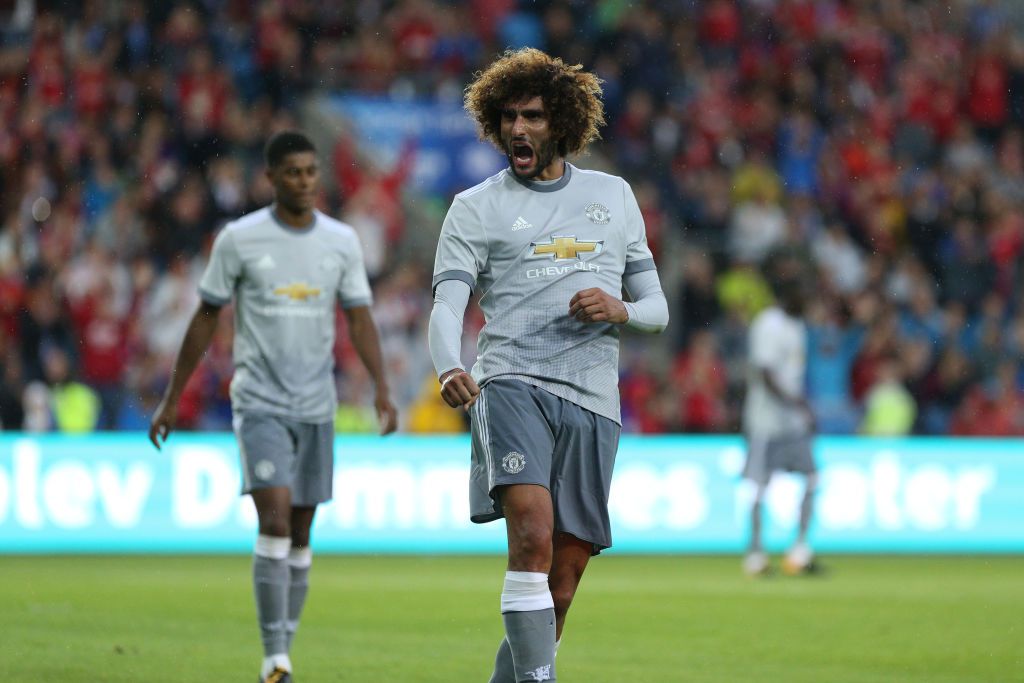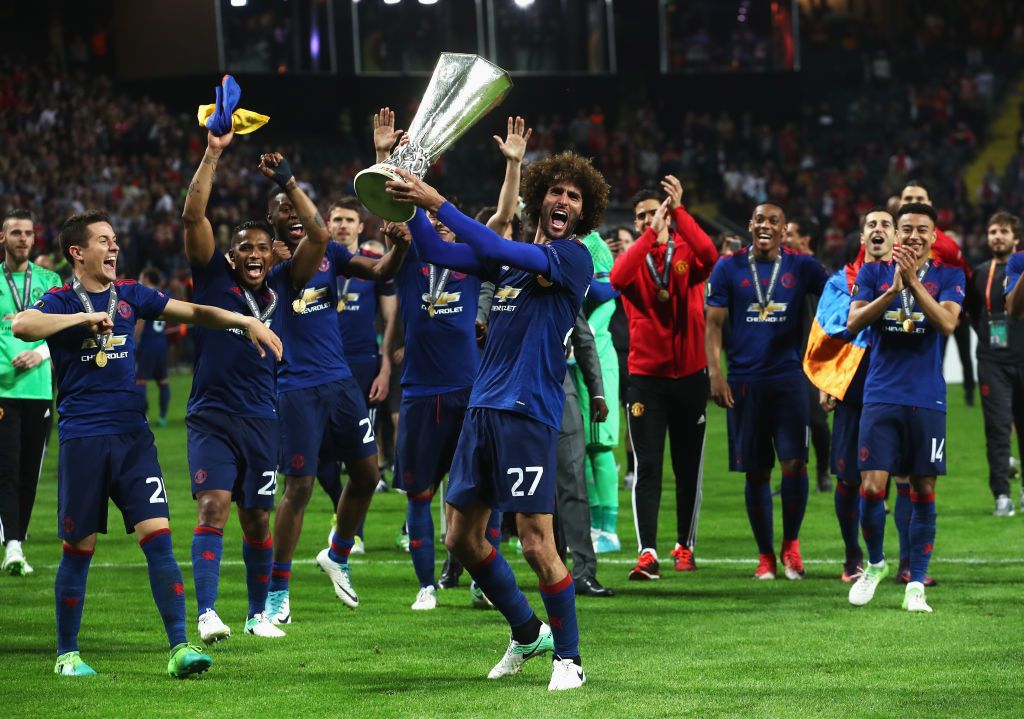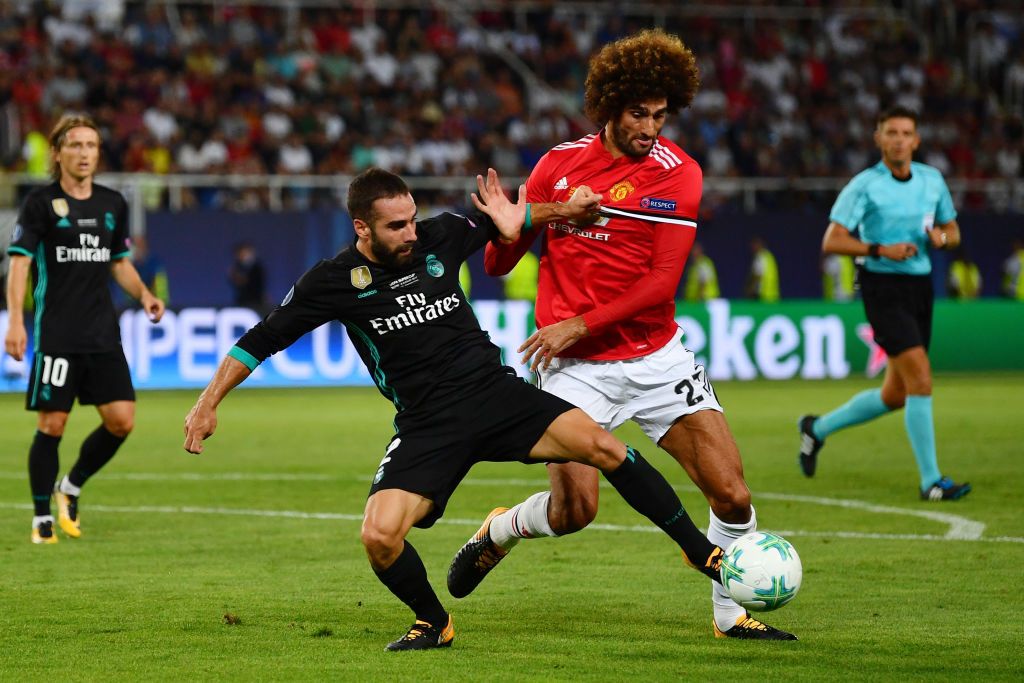

Share
9th August 2017
05:33pm BST

 In truth, for some of the club's fans, Fellaini's United career was damned almost as soon as it had started. With Moyes' clueless pursuit of unobtainable transfer targets bearing no fruit, it was only on the final day of the summer 2013 window that he decided to hit the panic button and bring Fellaini to Manchester. The move was clearly a contingency plan and its farcical timing set the tone for the months ahead.
While the blame for United's rapid post-Ferguson decline lay at the feet of Moyes, Fellaini swiftly became an on-field scapegoat after several lacklustre displays.
Nearly three-and-a-half years have passed since Moyes' departure, yet Fellaini's association with that season still makes it difficult for some supporters to make allowances for him. To them, individual errors, including sloppy passes or cumbersome challenges that lead to costly late penalties, serve as reminders that this a player that isn't good enough and never has been good enough for Manchester United.
While it's undeniable that he has been poor at stages of his United career, it's unfair to say this has always been the case. As Louis van Gaal attempted to steer the club back into the Champions League places towards the end of the 2014/15 season, his decision to deploy Fellaini in a more advanced position - one that he'd occupied for Everton as they dented United's title hopes at Old Trafford in 2012 - proved crucial in consecutive wins against Tottenham, Manchester City and Liverpool. He followed this with an important goal away at Crystal Palace which helped clinch a top four finish that season.
In truth, for some of the club's fans, Fellaini's United career was damned almost as soon as it had started. With Moyes' clueless pursuit of unobtainable transfer targets bearing no fruit, it was only on the final day of the summer 2013 window that he decided to hit the panic button and bring Fellaini to Manchester. The move was clearly a contingency plan and its farcical timing set the tone for the months ahead.
While the blame for United's rapid post-Ferguson decline lay at the feet of Moyes, Fellaini swiftly became an on-field scapegoat after several lacklustre displays.
Nearly three-and-a-half years have passed since Moyes' departure, yet Fellaini's association with that season still makes it difficult for some supporters to make allowances for him. To them, individual errors, including sloppy passes or cumbersome challenges that lead to costly late penalties, serve as reminders that this a player that isn't good enough and never has been good enough for Manchester United.
While it's undeniable that he has been poor at stages of his United career, it's unfair to say this has always been the case. As Louis van Gaal attempted to steer the club back into the Champions League places towards the end of the 2014/15 season, his decision to deploy Fellaini in a more advanced position - one that he'd occupied for Everton as they dented United's title hopes at Old Trafford in 2012 - proved crucial in consecutive wins against Tottenham, Manchester City and Liverpool. He followed this with an important goal away at Crystal Palace which helped clinch a top four finish that season.
 His presence in the Palace box in the FA Cup final the following season helped Juan Mata cancel out Jason Puncheon's equaliser, and he also bagged important goals in last season's League Cup and Europa League semi-finals.
Used correctly, he undoubtedly offers United something different, which leads us to this week's European Super Cup final and Mourinho's justification for wanting to keep him.
With nearly an hour gone in Skopje on Tuesday, Real Madrid were cruising. Isco had just added a second and the likes of Casemiro, Toni Kroos and Luka Modric were dictating play with ease. It was at this point that Mourinho introduced Fellaini, taking the place of Ander Herrera.
Clearly, an appearance from Fellaini wasn't ever going to be enough to completely turn the tide in the Macedonian capital, but his sheer presence appeared to disrupt Real's flow. Of course, Zinedine Zidane's men still had chances, but increasingly, so did United who were able to halve the deficit through Romelu Lukaku. Partly thanks to Fellaini, Real were looking far less comfortable and United were back in a game that had appeared over as a contest after just 55 minutes.
His presence in the Palace box in the FA Cup final the following season helped Juan Mata cancel out Jason Puncheon's equaliser, and he also bagged important goals in last season's League Cup and Europa League semi-finals.
Used correctly, he undoubtedly offers United something different, which leads us to this week's European Super Cup final and Mourinho's justification for wanting to keep him.
With nearly an hour gone in Skopje on Tuesday, Real Madrid were cruising. Isco had just added a second and the likes of Casemiro, Toni Kroos and Luka Modric were dictating play with ease. It was at this point that Mourinho introduced Fellaini, taking the place of Ander Herrera.
Clearly, an appearance from Fellaini wasn't ever going to be enough to completely turn the tide in the Macedonian capital, but his sheer presence appeared to disrupt Real's flow. Of course, Zinedine Zidane's men still had chances, but increasingly, so did United who were able to halve the deficit through Romelu Lukaku. Partly thanks to Fellaini, Real were looking far less comfortable and United were back in a game that had appeared over as a contest after just 55 minutes.
 Were it not for Sergio Ramos' intervention, Fellaini might even have levelled the scores later with a back post header. Instead, the ball sailed over the bar and the pair were floored by a clash of heads. Momentarily, Fellaini's night seemed to have been brought to a premature end by the incident. However, after being patched up with a (comical) bandage, he returned to the field for the game's final minutes.
This in itself spoke volumes about Fellaini, too. Whereas many have questioned his ability as a footballer during his time on the payroll at Old Trafford, few can knock his determination and mental resilience. Not only has he tolerated and bounced back from boos from some of his own club's supporters in the not-so-distant past, he also demonstrated his sense of self-deprecation in the hours after the full-time whistle on Tuesday by sharing a viral image of his own face - twisted and contorted after appearing to have been struck by a ball - on his own Twitter account.
https://twitter.com/Fellaini/status/895047548691517440?ref_src=twsrc%5Etfw&ref_url=https%3A%2F%2Fwww.joe.co.uk%2Fsport%2Feven-marouane-fellaini-sees-the-funny-side-to-that-european-super-cup-picture-137159
In short, turning to players such as Fellaini might not always be conducive to aesthetically-pleasing, free-flowing attacking football. But as Mourinho knows all too well, it can prove effective. For a manager such as him, who has never been shy of prioritising the result ahead of style when necessary, Fellaini's continued presence in the United squad - if only as an option to bring on from the bench - makes perfect sense.
Were it not for Sergio Ramos' intervention, Fellaini might even have levelled the scores later with a back post header. Instead, the ball sailed over the bar and the pair were floored by a clash of heads. Momentarily, Fellaini's night seemed to have been brought to a premature end by the incident. However, after being patched up with a (comical) bandage, he returned to the field for the game's final minutes.
This in itself spoke volumes about Fellaini, too. Whereas many have questioned his ability as a footballer during his time on the payroll at Old Trafford, few can knock his determination and mental resilience. Not only has he tolerated and bounced back from boos from some of his own club's supporters in the not-so-distant past, he also demonstrated his sense of self-deprecation in the hours after the full-time whistle on Tuesday by sharing a viral image of his own face - twisted and contorted after appearing to have been struck by a ball - on his own Twitter account.
https://twitter.com/Fellaini/status/895047548691517440?ref_src=twsrc%5Etfw&ref_url=https%3A%2F%2Fwww.joe.co.uk%2Fsport%2Feven-marouane-fellaini-sees-the-funny-side-to-that-european-super-cup-picture-137159
In short, turning to players such as Fellaini might not always be conducive to aesthetically-pleasing, free-flowing attacking football. But as Mourinho knows all too well, it can prove effective. For a manager such as him, who has never been shy of prioritising the result ahead of style when necessary, Fellaini's continued presence in the United squad - if only as an option to bring on from the bench - makes perfect sense.Explore more on these topics: